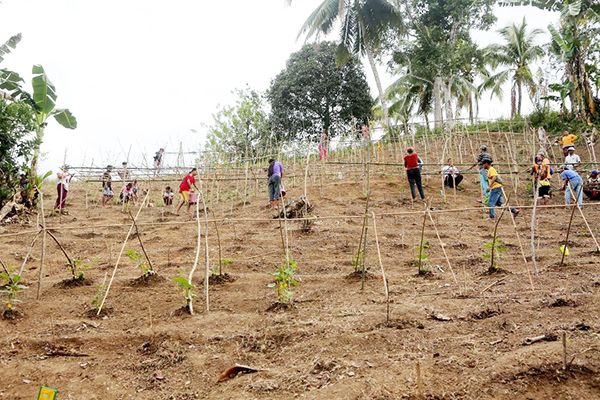FAO expands livelihood program in IP communities in Maguindanao del Sur
DAVAO CITY – The Food and Agriculture Organization of the United Nations is expanding its Resilient Livelihoods Development (RLD) project to the Indigenous Peoples (IP) communities in the mountainous town of South Upi in Maguindanao del Sur.
Lionel Dabbadie, FAO representative in the Philippines, said the project hopes to bring the lessons learned from the lowland to upland Maguindanao, where the Tedurays endure a similar struggle, worsened by the recurring climate-induced flooding and resource-based conflict.
“The Tedurays face a unique challenge as Indigenous Peoples, with rise in violence and land-grabbing that result to them being displaced,” Dabbadie said.

RESIDENTS work in their community garden in Barangay Kuya, South Upi, Maguindanao del Sur. (Keith Bacongco)
In recent months, South Upi, a town of about 42,000 people, was among the towns in Maguindanao del Sur that experienced rain-induced flooding and landslides that led to displacement of hundreds of residents, mostly IPs belonging to the Teduray tribe.
Several Teduray leaders in the municipality were also displaced in recent conflicts due to land dispute which was identified as the root of the recent killings of tribal leaders in the municipality.
Dabbadie added that under the project, which kicked off last August and will run until August 2025, partner-beneficiaries and their communities will be taught about food production.
He said that communities will also learn how to utilize raw materials that are locally available throughout the year, particularly those that can be stored for several months without losing its nutritional value as well as applying their local knowledge in food production.
During a recent gathering here with implementing partners from the Bangsamoro Autonomous Region in Muslim Mindanao, FAO stated that the IP communities in South Upi face compounded challenges of displacement due to land disputes, poverty, high adolescent pregnancy rates, and gender-based violence (GBV).
It emphasized that the expansion of the project aims to empower IP communities in South Upi by enhancing livelihoods, health, and protection services, with a focus on Gender Equality, Disability, and Social Inclusion (GEDSI).
The project will focus on addressing these issues by empowering IP women and youth through agricultural-based livelihood interventions that are culturally sensitive and inclusive.
Prior to the expansion in South Upi, the project was implemented with community-based organizations (CBOs) in the towns of Datu Odin Sinsuat, Guindulungan, Shariff Saydona Mustapha, and Talitay, Maguindanao del Sur.
Under the first phase, the United Nations Population Fund (UNFPA) and FAO provided the internally displaced persons (IDPs) with agricultural inputs and technologies, as well as skills training to enable conflict-affected women and youth to establish and effectively run agriculture-based livelihoods or enterprises.
Established CBOs under the first phase of the project will serve mentors and coaches to guide the IPs in the expansion program.
FAO said that the expansion program in South Upi underwent consultations from the IPs.
CBOs will share lessons on organizational management, market linkages, and financial literacy, translating these concepts into simple and practical terms, FAO said.